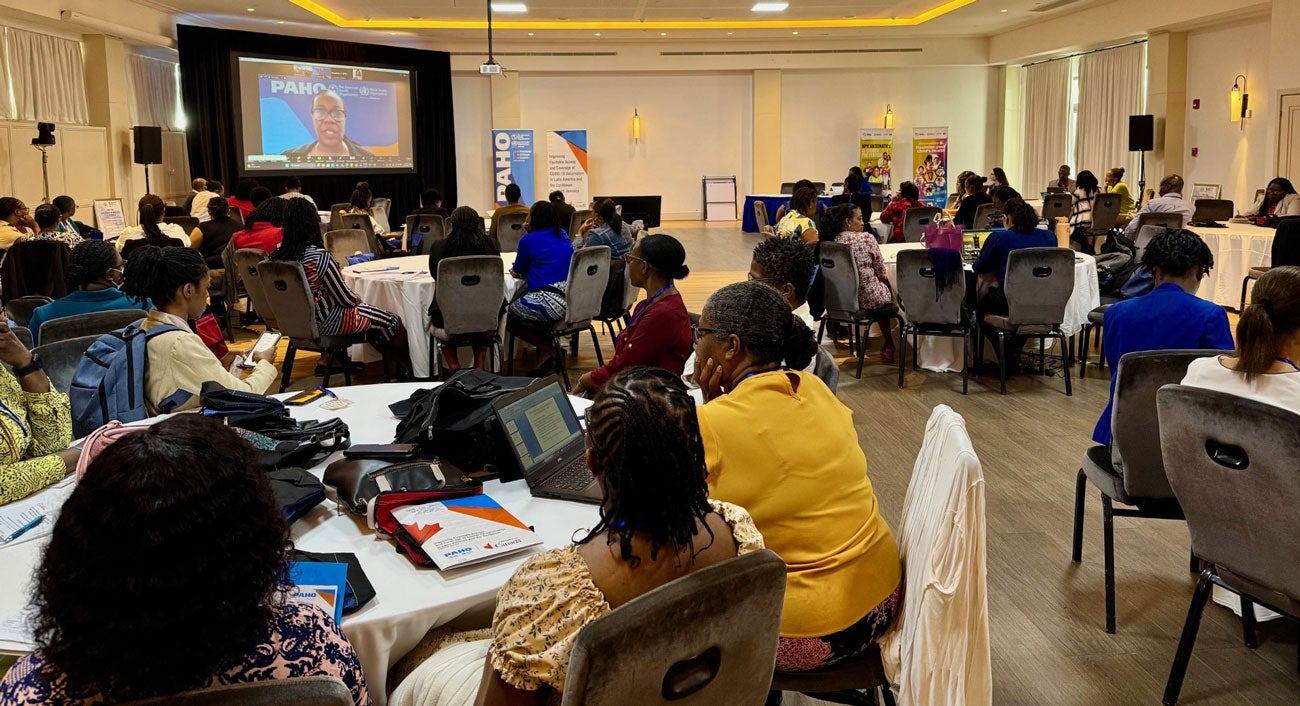
Kingston, Jamaica, 20 December 2024 (PAHO/WHO) – Jamaica’s Expanded Programme on Immunization (EPI) has made significant progress towards strengthening the country’s defense against vaccine-preventable diseases through a workshop held on 16-17 December 2024 in Trelawney. The workshop provided 106 health workers with essential resources, updated tools, and a comprehensive understanding of the current challenges that are impacting efforts to achieve broader vaccine coverage across the island.
A key highlight of the workshop was the introduction of the updated EPI Field Guide for Health Workers. This comprehensive resource offers practical guidance on immunization procedures by helping health professionals navigate the evolving landscape of vaccine administration and management. From maintaining cold chain operations at all levels of the EPI supply chain to introducing new vaccines into the national immunization schedule, the guide serves as an essential tool in ensuring effective immunization practices across the island.
The workshop emphasized three essential points for all immunization programmes in the post-pandemic period. First, the importance of the life course approach to vaccination, which promotes moving immunization efforts beyond childhood to include persons in their teenage years, pregnancy, and older age. This approach has been crucial in protecting Jamaica from outbreaks of major vaccine-preventable diseases such as polio, measles, mumps, and rubella, and facilitating the introduction of new vaccines. Second, the explicit consideration for gender, age, cultural, and social factors, which can act as barriers to vaccination and health-seeking behavior. Workshop participants reflected on how to ensure equitable access to vaccines for all population groups. Third, the integration of vaccination services with other essential health services to improve the package of services offered to patients in each age group.
This activity is supported by the Government of Canada, through Global Affairs Canada, under the CanGIVE initiative, which focuses on strengthening immunization programs in the region. With Jamaica as one of the focus countries, the initiative aims to enhance public health outcomes by providing essential resources and training to health workers, ensuring equitable access to vaccines, and improving the overall effectiveness of immunization efforts in the country.
The workshop included interactive exercises on practical case studies to complement the event during the second day. Participants delved into the application of surveillance concepts to field problems, including events supposedly attributable to vaccination or immunization (ESAVI), to strengthen Jamaica’s capacity to detect and respond to vaccine-related issues and ensure that the immunization system remains responsive and efficient. The dissemination of the updated manual was made possible through a partnership with the Pan American Health Organization/World Health Organization (PAHO/WHO) and UNICEF.
Dr. Julia Rowe-Porter, Acting Director of the Family Health Unit and National EPI Manager, expressed appreciation for the ongoing support from international partners in strengthening Jamaica’s Expanded Programme on Immunization (EPI). She emphasized that the updated EPI Field Guide and the workshop are vital for building the capacity of the immunization team at all levels. Dr. Rowe-Porter noted that these efforts would help maintain high standards for the programme and ensure equitable access to quality vaccination services across the island.
Another priority for the EPI programme is ensuring that vaccines are stored and transported at the correct temperatures to preserve their effectiveness. Efforts are underway to strengthen cold chain management, ensuring that every vaccine reaches its destination in optimal condition. Additionally, improvements in data collection and reporting will enhance the ability to track immunization coverage and monitor trends in vaccine-preventable diseases more effectively. The workshop was an opportunity to bring the latest updates and guidelines to the participants.
Additionally, the workshop discussed the MOHW’s ongoing community engagement and public education activities to keep the public informed and confident in the vaccines they receive to address misinformation and reduce vaccine hesitancy.
The EPI programme of Jamaica is committed to continuous training and professional development for health workers, ensuring they are equipped to meet emerging immunization challenges. This workshop was an important step to ensure that the EPI programme is well-positioned to continue its critical work in protecting the population from vaccine-preventable diseases, improving public health outcomes, and contributing to global immunization goals.




